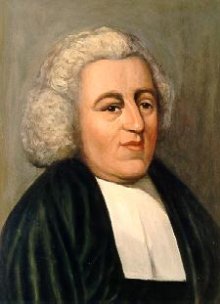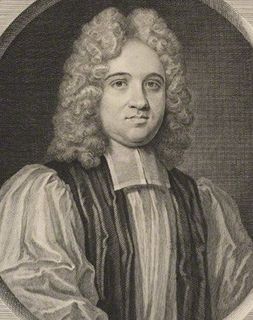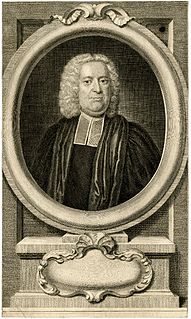Related Research Articles

Daniel Defoe, born Daniel Foe, was an English trader, writer, journalist, pamphleteer and spy. He is most famous for his novel Robinson Crusoe, published in 1719, which is claimed to be second only to the Bible in its number of translations. He has been seen as one of the earliest proponents of the English novel, and helped to popularise the form in Britain with others such as Aphra Behn and Samuel Richardson. Defoe wrote many political tracts and was often in trouble with the authorities, and spent a period in prison. Intellectuals and political leaders paid attention to his fresh ideas and sometimes consulted with him.

John Newton was an English Anglican clergyman and abolitionist, also having been Captain of slave ships and investor of trade. He served as a sailor in the Royal Navy for a period after forced recruitment.
Thomas Ellwood was an English religious writer. He is remembered for his relationship with poet John Milton, and some of his writing has proved durable as well.

Edmund Gibson was a British divine who served as Bishop of Lincoln and Bishop of London, jurist, and antiquary.

In March 1698, Jeremy Collier published his anti-theatre pamphlet, A Short View of the Immorality and Profaneness of the English Stage; in the pamphlet, Collier attacks a number of playwrights: William Wycherley, John Dryden, William Congreve, John Vanbrugh, and Thomas D’Urfey. Collier attacks rather recent, rather popular comedies from the London stage; he accuses the playwrights of profanity, blasphemy, indecency, and undermining public morality through the sympathetic depiction of vice.

George Horne was an English churchman, academic, writer, and university administrator.

Lodowicke Muggleton (1609–1698) was an English religious thinker who gave his name to Muggletonianism, a Protestant sect which was always small, but survived until the death of its last follower in 1979 [Note: There is some anecdotal evidence of Muggletonians in existence as late as 2000.] He spent his working life as a journeyman tailor in the City of London and was imprisoned twice for his beliefs. He held opinions hostile to all forms of philosophical reason, and had received only a basic education. He encouraged quietism and free-thought amongst his followers whose beliefs were predestinarian in a manner that was distinct from Calvinism. Near the close of his long life, Muggleton wrote his spiritual autobiography which was published posthumously.
William Webster (1689–1758) was a British priest in the Church of England and a theological writer.

John Pordage (1607–1681) was an Anglican priest, astrologer, alchemist and Christian mystic. He founded the 17th-century English Behmenist group, which would later become known as the Philadelphian Society when it was led by his disciple and successor, Jane Leade.

Sir William Dawes, 3rd Baronet, was an Anglican prelate. He served as Bishop of Chester from 1708 to 1714 and then as Archbishop of York from 1714 to 1724. Politically he was a Hanoverian Tory, who favoured the Hanoverian Succession.

William Smith was the first provost of the College of Philadelphia, which became the University of Pennsylvania. He was also the founder of Washington College in Chestertown Maryland, and St. John's College in Annapolis, Maryland.

Richard Smalbroke was an English churchman, Bishop of St David's and then of Lichfield and Coventry.

Samuel Bradford was an English churchman and whig, bishop successively of Carlisle and Rochester.
Edmund Hall (1620?–1687) was an English priest of presbyterian and royalist views, an opponent of Oliver Cromwell who was imprisoned for his attacks.

William Stanley (1647–1731) was an English churchman and college head, Master of Corpus Christi College, Cambridge, Archdeacon of London and Dean of St Asaph.

Thomas Comber (1645–1699) was an English churchman, Dean of Durham from 1689.
The Very Reverend John Lynch (1697–1760), of The Groves at Staple, Kent, was an 18th-century Church of England clergyman, Royal chaplain to the King (1727-34) Dean of Canterbury (1734-60) and Archdeacon of Canterbury.
Dorothy White was an English Quaker and writer of religious pamphlets. These give useful information on Quaker beliefs at that time, for instance, in relation to the Inner Light.
Thomas Lynford was Archdeacon of Barnstaple.

Thomas Stackhouse (1677–1752) was an English theologian and controversialist.
References
- ↑ "The Plague and the Fire: Reminiscences of Restoration Times". www.historytoday.com. History Today. Retrieved 2019-09-06.
- ↑ Adrian Tinniswood (31 January 2011). By Permission Of Heaven: The Story of the Great Fire of London. ISBN 9781446402719.
- ↑ Thomas Johnson (1722). The Rector Corrected. Being an Answer to William Taswell, (who is Stiled D. D. and Rector of St. Mary Newingtonin Surry.) Wherein his Objections against the Quaker in his Pamphlet, Intituled The Popish Priest Unmask'd, are reduced to four Heads, viz. I. The Qualification and Call of a Gospel-Minister II; His Maintenance; III. Baptism; IIII. The Supper; Which important subjects are briefly set in a true Light ; with some Remarks on several of the Doctors false, ridiculous and defamatory Stories. the Assigns of J. Sowel, at the Bible in George-Yard in Lombard-Street.
- ↑ John Fallowfield (1723). A Brief Examination of William Taswell's Book, Entituled Antichrist Reveal'd Among the Sect of Quakers. Wherein His Gross Abuses and False Charges Are Considered and Detected. the Assigns of J. Sowel, at the Bible in George-Yard in Lombard-Street.
- ↑ Nicholas Keene (2002). "John Fell: Education, Erudition and the English Church in Late Seventeenth-Century Oxford". In Mordechai Feingold (ed.). History of Universities: Volume XVIII/1 2003, Volume 18. Oxford University Press. ISBN 9780199262021.
- ↑ 'Tabbe-Thomyow', in Alumni Oxonienses 1500-1714, ed. Joseph Foster (Oxford, 1891), pp. 1453-1478.